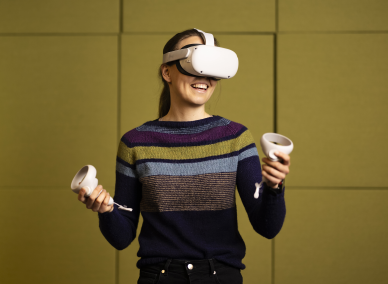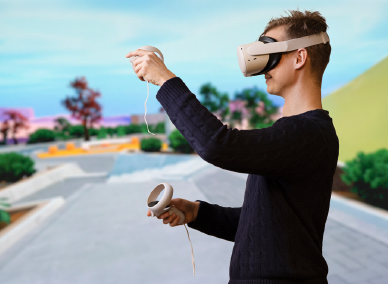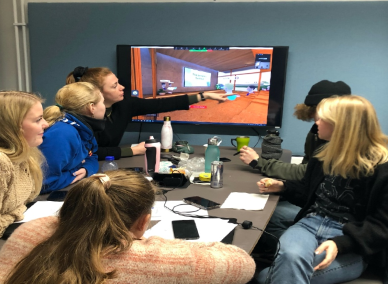Emerge
EMERGE - Centre for Student-Active Learning and Emerging Technologies

In a world characterized by rapid transformations of technology, society and culture, we want to establish a practice for continuous, systematic development of education, to keep up with the world. At the front are the students themselves as explorers of emerging technologies and ways of learning. The goal is to improve universities, and other learning institution’s ability to facilitate continuous development of learning methods. This involves technology, organization, rooms, methods of learning and assessment. A dialogical teacher-student-relation is central, motivated by shared matters-of-concern in the exploration of an emerging world. We achieve this through an experimental approach to teaching wherein the classroom is considered as a “laboratory”, where we not only learn together, but also discover how to learn. The annual cycles of experimentation is at the heart of EMERGE, gathering, engaging, developing and making available existing recourses of education.
EMERGE and "Fremtidens Campus"
TeTL-TI
TeTL-TI is a collaborative project between the archeology program at NTNU, the Department of Geography (NTNU) and VR-Learn. Together, these have worked to uncover what is required so that larger interdisciplinary projects working with the exploration of technology as a learning tool can be implemented in learning practices on campus.
See their findings in this video: https://ntnu.cloud.panopto.eu/Panopto/Pages/Viewer.aspx?id=78ee95da-3329-4bd5-b468-b0d800ab892e
Academic-social presence on a hybrid campus / Fagsosial tilstedeværelse på en hybrid campus
In this project, the Department of Anthropology (NTNU) has investigated which factors can contribute to a good academic-social environment among students. The aim has been to showcase spaces that arise in the tension between physical and digital spaces. The main question in this project is therefore: “How can we facilitate academic-social presence on a hybrid campus?”.
Report from November 15, 2023: "Fremtidens Campus".
EMERGE PARTNERS
Here is an overview of partners and resources, starting with the founding five departments at the Faculty of Social and Educational Sciences at NTNU:
- NTNU, Dep. of Social Anthropology (SA) The host for EMERGE.
- NTNU, Dep. of Geography (IGE)
- NTNU, Dep. of Psychology (IPS)
- NTNU Dep. of Education and Lifelong Learning (IPL)
- NTNU, Dep. of Teacher Education (ILU)
- NTNU, Dep. of Historical and Classical Studies, Archaeology (IHK)
Resources at NTNU:
- BLINK learning hub
- Dragvoll VR lab
- Section for Teaching and Learning (SLS)
- Fremtidens campus
- The future HUMSAM-studies
- IT strategy and governance section
National and international collaboration:
- The Convservatoire national des arts et métiers (le cnam - France)
- NTNU Social Research (NSR - Norway)
- The West University of Timisoara (WUT – Romania)
- Izmir University of Economics (IUE-Turkey)
- The University of Roma Tre (ROMA3 - Italy)
- Monash University (Victoria - Australia),
- University of Strathclyde (UK)
- BREACH (company - Norway)
- House of Literature in Trondheim (Litteraturhuset I Trondheim)
EMEGE reports
- 2023: Emerging Education – Emerging Technology: Exploring the Emerging University
- 2022: Emergin Education - Emerging technology: Exploring the Emerging University
Team
-
Tormod Aagaard Assistant Professor
+47-73559864 tormod.aagaard@ntnu.no Department of Language and Literature -
Magnus Bergland-Landheim Senior Executive Officer
+4794851620 magnus.bergland-landheim@ntnu.no SU Faculty Administration -
Alexander Berntsen PhD Candidate
+47-73592398 alexander.berntsen@ntnu.no Department of Social Anthropology -
Martin Eugene Callanan Associate Professor
+47-73598322 +4740066995 callanan@ntnu.no Department of Historical and Classical Studies -
Jakob Bonnevie Cyvin PhD Candidate
+47-73559075 +4799598656 jakob.b.cyvin@ntnu.no Department of Geography -
Charlotte Fiskum Associate Professor in clinical community psychology
charlotte.fiskum@ntnu.no Department of Psychology -
Mikhail Fominykh Researcher
+4748603627 mikhail.fominykh@ntnu.no Department of Education and Lifelong Learning -
Ekaterina Prasolova-Førland Professor
+4799440861 ekaterip@ntnu.no Department of Education and Lifelong Learning -
Synne Svinsås Gjønnes PhD Candidate
+4791583053 synne.s.gjonnes@ntnu.no Department of Social Anthropology -
Håvard R. Karlsen Associate professor
+47-73559002 h.karlsen@ntnu.no Department of Psychology -
Mari-Ann Letnes Associate Professor
+4741419295 mari.ann.letnes@ntnu.no Department of Teacher Education -
Tuva Fjærtoft Lønne
hvasarule@yahoo.no Department of Geography -
Berit Therese Nilsen Associate professor/Senior researcher
+4799534676 berit.t.nilsen@ntnu.no Department of Geography -
Jens Olgard Dalseth Røyrvik Associate Professor
jens.royrvik@ntnu.no Department of Social Anthropology -
Ingvild Saksvik-Lehouillier Professor
+47-73550864 ingvild.saksvik.lehouillier@ntnu.no Department of Psychology -
Heidrun Marie Voldheim Stebergløkken Associate Professor
+47-73590334 heidrun.steberglokken@ntnu.no Department of Historical and Classical Studies -
Marie Opdal Ulset PhD Candidate
+4741171995 marie.o.ulset@ntnu.no Department of Social Anthropology -
Patric Wallin Professor
+4792097119 patric.wallin@ntnu.no Department of Education and Lifelong Learning
Explore

EMERGE is a centre aiming at making educational institutions, starting with NTNU, able to incorporate exploration of emerging technologies and culture, and development in their ordinary teaching and learning practice, including their origination, culture, technical and physical facilities.
Evolve

The current EMERGE experiments include 9 courses at NTNU, an emerging learning lab and external projects. A course may be part of EMERGE for 2-5 years, being subject to exploration and transformation. After this period the course should be able to continue its development with a much looser connection to the center. This shows our on-going cycle of trial and evolution.
Excel

